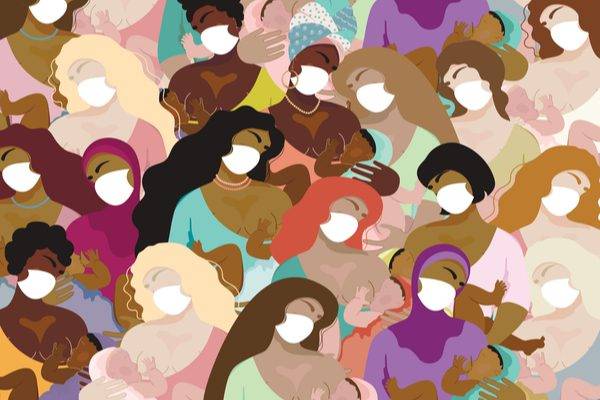Whether you’re a bare-it-all nurser or a cover-it-up gal, there’s one thing everyone can agree on: nursing during the holidays is its own challenge. Traveling, busy schedules, constantly being surrounded by loved ones, and even wanting to partake in the holiday egg nog have all been to blame for “holiday weaning.”
Holiday weaning is a term used when a mom accidentally nurses less during the holidays which leads to lower milk supply and, for some, an early end to breastfeeding altogether.
If you don’t want to add holiday weaning to your list of holiday stressors, check out these tips for prioritizing breastfeeding and your comfort while breastfeeding at home or on the road.
Tips for Breastfeeding During the Holiday Season
Traveling and Breastfeeding
Breast milk is a great baby food to travel with. It’s all contained within your body! You can take it on airplanes with you and it travels well by car too. If you’re traveling by car, make sure you take breaks when your baby needs to eat. Baby’s feeding routine likely won’t change while you travel. So if your little one eats every two hours, expect to park just as often. Many moms find they can even feed without having to remove their baby from their car seat.
When traveling by plane, train, or bus, remember to take a sling as this can provide discretion and comfort for you and your little one while breastfeeding. It’s also a good idea to avoid taking the red-eye route. You may think it’s a good idea since your baby will sleep, but you won’t sleep well, and that puts you at risk for mastitis, exhaustion, low supply, and even illness.
Nursing Away From Home
Here’s a secret all moms need to know: your hosts will make adjustments for your comfort if you ask them to. It is the best thing for you to not host this year. So when you go to visit the grandparents, aunts, and uncles just remember they want to help you. Ask them to prepare a quiet place for breastfeeding, a comfortable bed with pillows you can lay on, and a way to play soothing music. Even if you’re comfortable nursing in front of people, having a space to go when you’re overwhelmed or your baby is tired will be a holiday gift!
Watching What You Eat while Breastfeeding
While nursing, you have to watch what you eat, and that doesn’t change during the holidays. In fact, there are some foods and herbs popular in holiday cooking that can lower your milk supply. You already know to avoid alcohol—that counts for the glass of Thanksgiving wine or Grandpa’s special egg nog too (though if you do partake, remember that only one regular alcoholic drink is okay if you wait two hours to breastfeed or you can pump and dump. Read more of the CDC’s guidelines on alcohol consumption and breastfeeding). You should also avoid the following as they can lower your milk supply:
- Sage
- Peppermint
- Parsley
- Oregano
- Cabbage leaves
On-Demand Feeding
Baby’s routine will be thrown in the air during the holidays with all of the shopping, going to parties, and baking treats. As the daylight gets shorter and the nights get fuller, you may begin missing feeding cues. Your baby may also try to feed at different times than normal. Trust your instincts! If it seems like your baby should be hungry, take the time to feed them.
You may also find that your baby is crying more during nursing time. Whether they are overwhelmed, anxious, or simply need to be comforted, they might need extra time on the breast. This can feel frustrating when you have a million things to do. But ultimately it will help both you and your baby relax and ensure milk supply keeps flowing.
And don’t forget you! Your own body cues need close attention so you can eat. Remember that you need the calories to maintain your milk supply, so make sure you’re grabbing a snack when you can, and don’t skip meals.
Protecting Your Baby From Illness
When winter rolls in, more time is spent indoors, and less fresh air filters through homes. This is a breeding ground for illness, and most of the time, the contagions are transferred between homes, stores, and other public places. Getting sick is not good for you or your baby, so follow these guidelines to protect yourself from the cold and flu:
- Ask those who want to hold your baby to use hand sanitizer first.
- If you notice someone at the event is sick, avoid contact with that person, and leave early if possible.
- Ask family and friends to not kiss your baby or lean in very close to their face.
- Wash your hands thoroughly and regularly.
- Give baby a bath after a social event.
- Make sure you and your baby are wearing weather-appropriate clothing.
If you do get ill and need to take medicine, make sure to check with your doctor to verify whether it is safe to take while breastfeeding.
Just remember, the holidays are great for introducing your new baby to friends and family. This is meant to be a time of love, sharing, and fun. You can feel “normal” (and not just like someone’s pacifier) by going out and enjoying the company of others. It will take a bit of patience, a little extra time scheduled in, and some extra precautions, but breastfeeding during the holidays doesn’t have to be difficult!


